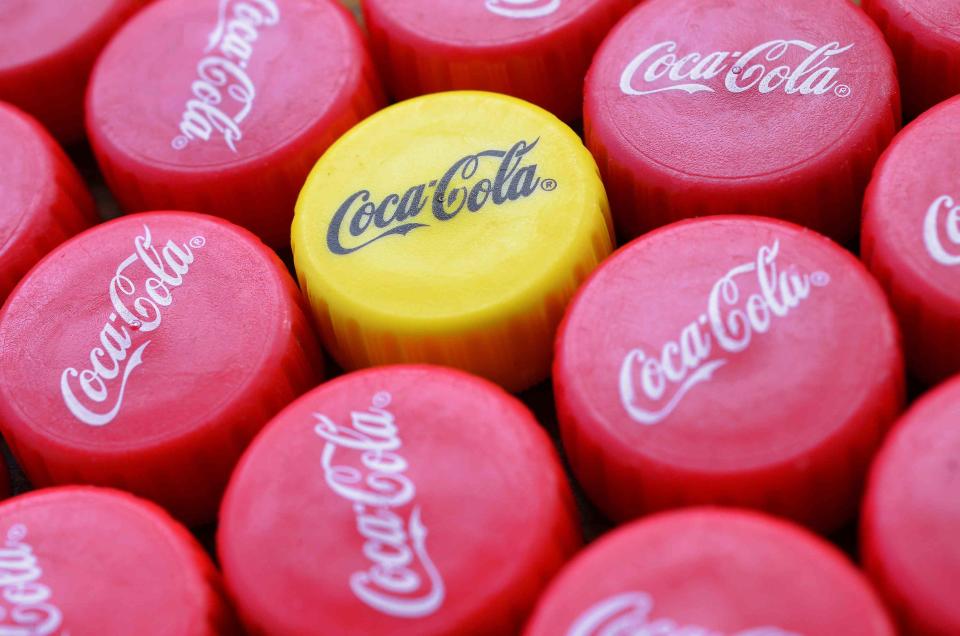Here’s Why Some Coca-Cola Bottles Have Yellow Caps in the Spring
This Coke is different from all other Cokes.

Mehaniq / Shutterstock
Some Coca-Cola bottles are getting their annual spring glow-up.
Supermarket shelves are now stocked with yellow-capped Coca-Cola bottles in observance of Passover, which begins on the evening of Monday, April 22 this year. The bottles reappear every spring as shoppers stock up on Kosher for Passover groceries, signifying that these bottles of Coca-Cola aren’t quite like the others.
Yellow-capped Coca-Cola bottles are certified Kosher for Passover. That is, the soda in these bottles is acceptable to drink on the Jewish holiday, which is observed with very specific dietary restrictions.
Kosher dietary restrictions are upheld year-round for Jewish people who follow a set of rules related to which meats are okay to eat, how animals can be slaughtered, and which foods must be separate from each other (dairy and milk can never mix, for example). Kosher for Passover dietary rules are even stricter for the eight days of Passover, eliminating all leavened foods in remembrance of the rush in which Israelite slaves fled Egypt, without time for their bread to rise.
Related: 18 Passover Recipes for a Delicious Seder
Food that is not Kosher for Passover is called chametz (pronounced ha-mets). Those who keep Kosher for Passover avoid chametz for the entire holiday, as well as anything cross-contaminated with these ingredients. This includes anything that rises, including bread and baked goods. Flour and grains are only permissible in matzo that has been certified Kosher for Passover.
All Kosher for Passover packaged foods must be supervised by a rabbi during production to ensure proper protocol. Passing the rabbi’s inspection earns a special certification on the item’s packaging, a hechsher (pronounced hek-sure), which can look like a P, and yes, does appear on yellow-capped Coca-Cola bottles.
Many Jewish people who keep Kosher for Passover also don’t eat kitniyot, a term that refers to legumes, rice, and corn, all of which grow when they cook — similar to leavened baked goods. The kitniyot restriction applies to corn syrup, a key ingredient in far too many American food products, including Coca-Cola.
Related: 5 Simple Steps to Host the Best Passover Meal
So, to satisfy millions of soda-loving Jewish people during Passover, Coca-Cola produces an alternate Coke recipe for the holiday, substituting high-fructose corn syrup with cane sugar to sweeten the drink. Sound familiar? Sugar is also the key sweetener in Mexican Coke, usually sold in glass bottles in the United States, and highly sought after by those who prefer the sugary taste. In fact, Kosher for Passover Coke and Mexican Coke have identical ingredient lists: Carbonated water, sugar, caramel color, phosphoric acid, natural flavors, and caffeine.
When yellow-capped Coca-Cola hits the soda aisle weeks before Passover, many flock to stock up on the two-liter bottles. Not only are the Kosher Cokes produced in limited quantities for the holiday, but the sugar-based bottled soda is less expensive than the imported Mexican Cokes. The 2-liter bottles of Kosher for Passover Coca-Cola typically go for about $3, which is about 4 cents an ounce. A 12-ounce bottle of Mexican Coke retails at about $3 or $4 in the United States. Stock up on the cheaper version before the holiday ends on Tuesday, April 30.
Related: The Best Reason to Buy Manischewitz Wine This Passover
Coca-Cola is hardly the only product to shift its recipe to accommodate Passover dietary requirements. Lay’s offers special-edition Kosher for Passover Salted Potato Chips in a red bag, substituting sunflower or vegetable oil (which may have corn) for palm oil, which is Kosher for Passover. Kosher food brands, like Kedem, which makes grape juice, and Manischewitz, which makes a slew of Jewish foods including matzo ball mix and wine, also adapt their recipes to create Kosher for Passover versions acceptable for consumption during the holiday.
Coca-Cola’s yellow-capped bottles are eye-catching, and they’re not the only new bottle the massive soda brand is showcasing this spring. Starting this April, all 20-ounce Coca-Cola products will be packaged in bottles made from 100% recycled material. The shift is expected to save about 83 million pounds of plastic, that is, two billion bottles, within Coca-Cola’s supply chain. Coca-Cola aims to use at least 50% recycled material in all packaging by 2030, part of an ongoing corporate eco-friendly pledge to create a “world without waste.”
For more Food & Wine news, make sure to sign up for our newsletter!
Read the original article on Food & Wine.

 Yahoo Sport
Yahoo Sport 




































































